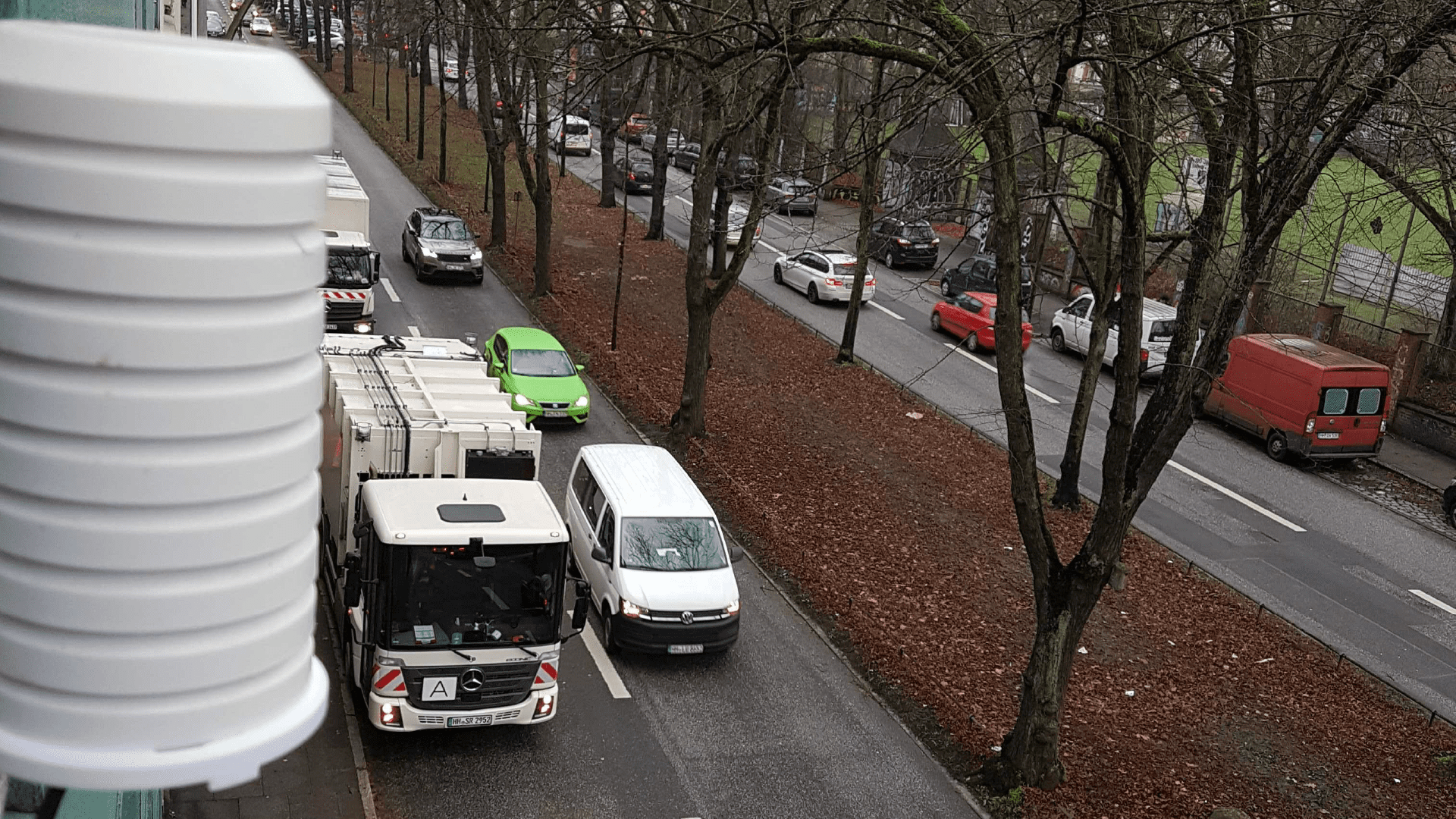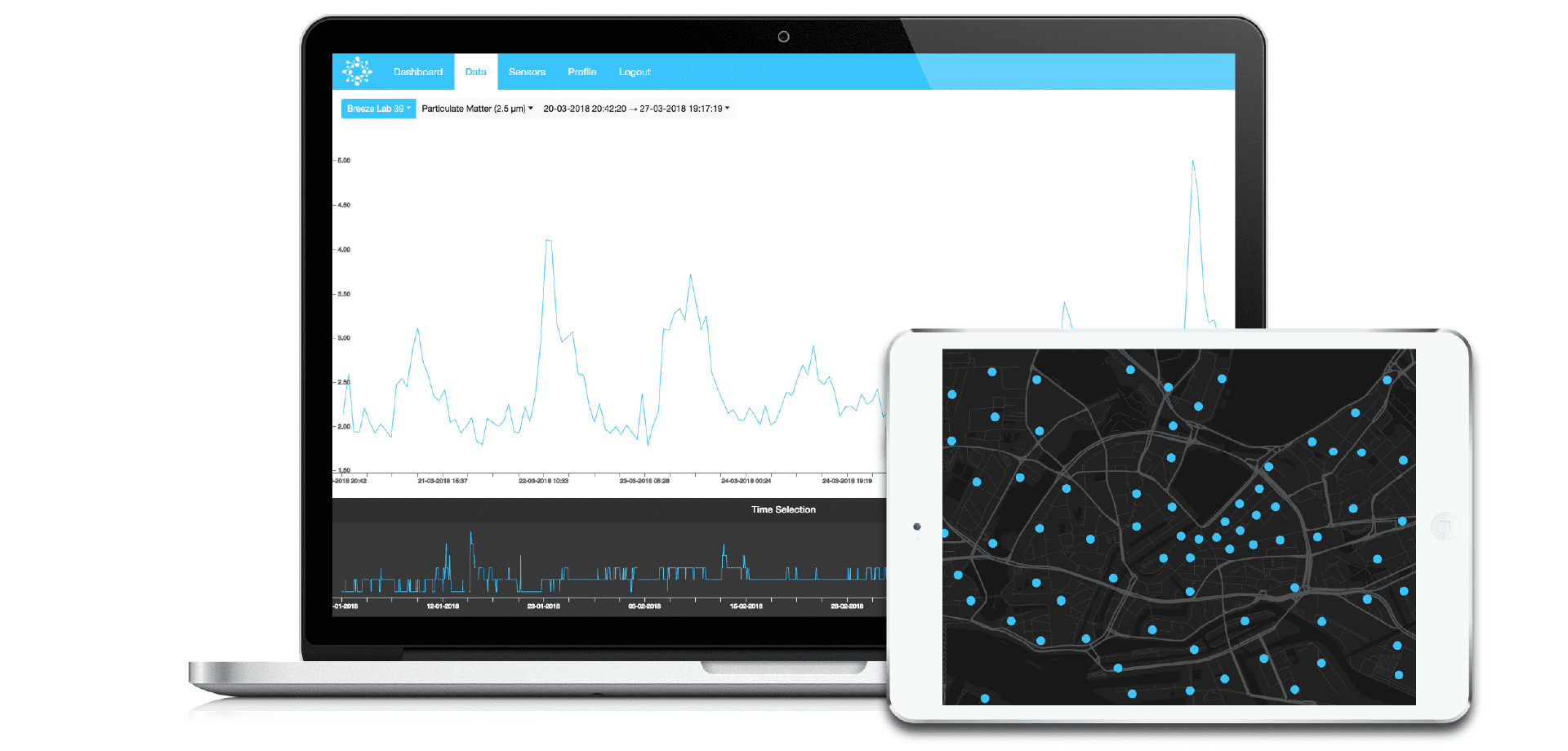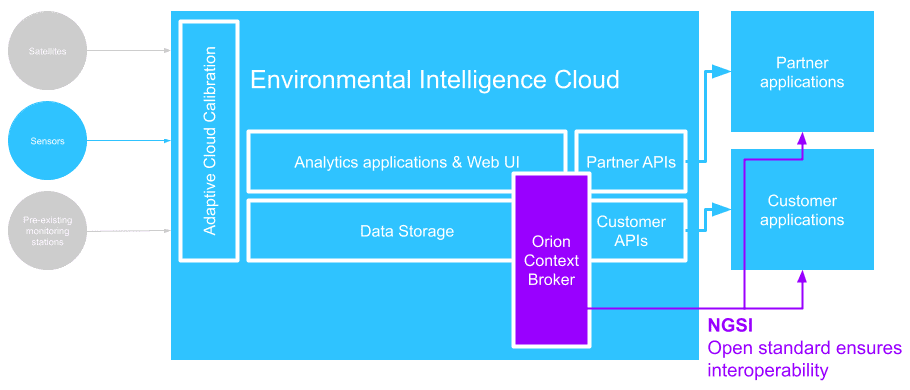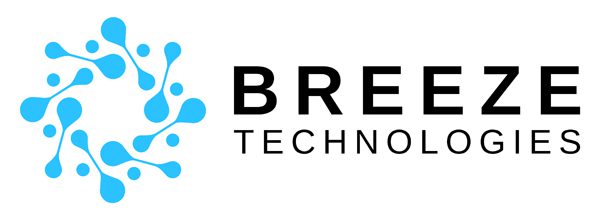Challenge & Context
Air pollution is the greatest environmental health threat of our time. 9 out of 10 people globally are living in areas with levels of pollution over officially established health limits. The UN reports that “almost 80% of deaths caused by air pollution could be avoided if current air pollution levels were reduced to the WHO Air Quality guidelines.” Not only is air pollution affecting our lives, but it also causes up to 1.6 trillion USD in economic damages per year. Poor air quality can affect most diverse areas like the stock market, trigger asthma attacks and cause the number of emergency room visits to skyrocket.
Breeze Technologies believes that distributed networks of small-scale environmental sensors can enable an entirely-new approach to understand our environment. Breeze is the first European company to facilitate the full lifecycle of environmental analytics: with the company’s air quality LoRa-enabled sensors, a cloud platform for data assessment and action implementation and a partner network able to conduct the necessary interventions to sustainably improve indoor and outdoor air quality.
Based on this data, Breeze has been enabling a completely new host of environmentally-sensitive applications and business models that are fueled by their environmental data platform. Let’s have a look at one example: Imagine you plan to go running in a densely populated area. Based on hyperlocal air quality data and forecasts, an innovative sports app can recommend the healthiest — that is, the least polluted — running route based on a person’s current position.
For example, also citizens with respiratory illnesses, asthmatics in particular, can benefit from such a sports app, when affected by high levels of air pollution, which can even trigger an asthma attack.
FIWARE comes with a vibrant ecosystem developing and delivering Smart City applications (next to a variety of other vertical applications), which supports Breeze in achieving its vision of a cleaner, eco-friendly, and innovative future. Thanks to FIWARE’s open platform and interoperability standards, Breeze’s partners and other third parties can leverage their solutions for even more application scenarios, from real estate and insurance through to tourism, from traffic management to urban planning processes. FIWARE shares the same goals as Breeze to create future smart and sustainable cities.
Solution
Since air pollution has been acknowledged as a major environmental threat, there is a strong requirement for a higher awareness of how individuals can also take action to prevent air pollution. Breeze Technologies believes that the best clean air strategies and action plans are based on accurate, comprehensive, and hyperlocal data in indoor, urban, and industrial monitoring and management. To understand the city’s air quality levels in real-time, monitoring of air quality and pollution levels need to be established.
Figure 1 . Breeze Technologies urban air quality sensor
To achieve this, Breeze Technologies deploys its own air quality sensors that are up to 1,000 times cheaper and 50,000 times smaller than legacy monitoring solutions. The air quality sensors measure the most common air pollutants along with other meteorological indicators in real-time. Data is then transmitted to Breeze’s Environmental Intelligence Cloud. The data is calibrated through their proprietary Adaptive Cloud Calibration (ACC) Engine, increasing data quality, reliability and accuracy of sensor data.
Figure 2 . The Environmental Intelligence Cloud
Using this data, Breeze’s Technologies Environmental Intelligence (EI) Cloud matches identified air pollution challenges with a growing catalogue of more than 3,500 clean air actions, identifying the most efficient and effective ones.
The data from this EI Cloud also empowers other applications. FIWARE’s NGSI standard, which is provided through the Context Broker, enables a wide ecosystem of players to consume and integrate air quality data into their own Smart City solutions.
Breeze Technologies’ partners include Microsoft, SAP, NTT, and many more international and national organizations. Named one of Europe’s most promising start-ups, Breeze Technologies has also been featured on Forbes, Bloomberg, ZDF (Zweites Deutsches Fernsehen) and others.
How it works
Breeze Technologies’ air quality sensors measure every 30 seconds the most common air pollutants and climate indicators (Temperature, Humidity, CO, CO2, PM2.5, PM10, NO, NO2, SO2, NH3, VOCs, O3). Data can be transmitted to the Breeze Environmental Analytics Cloud through various wireless standards, including WiFi, LTE and LoRa.
Sensor data is checked, filtered and calibrated in real-time to increase data quality and accuracy. The calibration works on the basis of a neural network, including more than 30 different dimensions in correcting the data, e.g. for sensor drift and influences of temperature and humidity. In benchmarks, the system achieves up to 90% accuracy compared to air quality monitoring equipment up to 1,000 times more expensive.
The Environmental Intelligence Cloud helps Breeze’s customers to interpret historic and real-time sensor data even without extensive knowledge in environmental sciences while data is aggregated understandably. The platform offers insights into which situations are critical and need to be surveyed more extensively. Based on a catalogue of more than 3,500 solutions and best practice examples, decision-makers are offered actionable insights on how to improve challenging air quality situations. Data is of course also exportable through real-time and historic APIs (NGSI through FIWARE Orion Context Broker, JSON/REST) to be included in diverse Smart City or Smart Building management systems.
Figure 3 . Breeze Technologies’ architecture including Orion Context Broker and NGSI data exchange
However, today we can still see a vast variety of different standards and interfaces in the Smart City space. The Orion Context Broker provides a unified European (and beyond) integration stack based on open source technologies, which thereby ensures a broad variety of cross-compatibility. The FIWARE de-facto standard for Smart Cities has been created and refined through a globally open collaboration across traditional geographic, industrial and technological boundaries.
Via the optional Breeze Citizen Portal, the public can access global air quality data from public monitoring stations and Breeze’s own sensors. With more than 10,000 datasets globally, the platform is one of the world’s biggest air quality information platforms in Germany.
Benefits & Impact
Breeze Technologies’ air quality monitoring and management solution is up to 1,000 times cheaper with a sensor up to 50,000 times smaller than legacy monitoring systems. This cost benefit, coupled with an enormous decrease in operations and maintenance complexity, also enables smaller communities and NGOs to start collecting and contextualizing environmental data. This had previously been impossible due to the permittivity cost and complexity of legacy solutions.
Breeze’s Environmental Intelligence Suite is deployed in 11 countries on 3 continents, collecting air quality data and providing air pollution intelligence solutions. In addition, the Environmental Intelligence Cloud enables other data-based use cases, such as air quality-based routing (HealthyPlaces app) and automated wildfire detection. Currently, the Environmental Intelligence Suite has positively impacted the lives of more than 2.5 million people to date.
Customers include German cities like Neckarsulm, Moers and Hennef, as well as private companies like Mitsubishi Electric.
The optional Breeze citizen portal enables cities to include citizens in clean air action efforts, increasing acceptance and support for clean air action plans. This increased transparency can also incentivize citizens to involve themselves in the clean air action efforts of their communities, and increase acceptance of clean air actions.
Added value through FIWARE
Breeze Technologies has been part of the FIWARE ecosystem since 2015. The startup was originally established through SpeedUP! Europe, a FIWARE accelerator programme focussed on Smart City applications. With the help of FIWARE grants and the use of FIWARE components, Breeze was able to quickly prototype and iterate their solution while developing it. Since then, Breeze Technologies has been using the Orion Context Broker to provide air quality data in a standardized API format (NGSI), ensuring easy-to-use interoperability for other Smart City applications.
Next Steps
Breeze Technologies is looking for system integrator partners in several use cases:
- Smart City integrators: providers of horizontal smart city platforms that would like to integrate air quality use cases.
- Smart industry and Smart Building integrators that are interested in outdoor and indoor air quality monitoring capabilities.
Additionally, Breeze Technologies is looking for providers of concrete clean air actions (products and services) with a measurable positive impact on outdoor or indoor air quality. These actions can be listed in Breeze’s clean air action database and recommended to a growing number of customers.
Lastly, companies and startups that would like to leverage Breeze’s pool of air quality data to turn their own apps and services environmentally-sensitive are invited to connect with Breeze Technologies directly.




